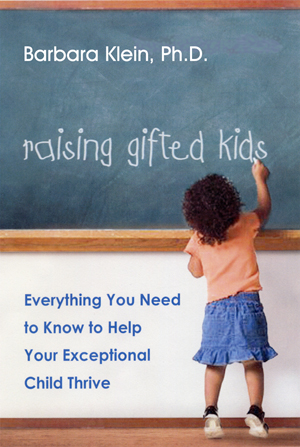
Raising Gifted Kids: Everything You Need to Know to Help Your Exceptional Child Thrive
Stories of gifted children fill my mind, amuse me, and warm my heart. Jacob at 9 months calls the flowers in his garden bougainvilleas. Camden at 18 months can sing and perform the alphabet song. David at 20 months can name and categorize every kind of car by manufacturer. Matt at barely 2 years can put together a sixty-four piece puzzle. Jake at 3 is trying to understand black holes. Mary Katherine and Alexandra, four-year-old fraternal twins, enjoy explaining the digestive system and other aspects of the human body. Millin at 5 gives a piano recital of Rachmaninoff. Dulcinee at 6 performs violin in Carnegie Hall.
Raising extremely bright children is a serious and extremely important parental challenge. Countless times parents have asked me, "How can I challenge my child to use her gifts?"
Additional questions often follow, and they are not easy questions to answer.
How do I best support my child emotionally?
How do I pick the best school?
How do I get the teachers and administrators to care about my child’s special needs?
And what do I do next to develop my child’s potential?
While it is rewarding to raise a quick, curious, sensitive, and introspective child, it is at the same time a very difficult task. I know how difficult it is, because I have spawned two gifted children myself. And I’ve been answering parents’ questions for 30 years as a professional in the fields of psychology and education.
You need a lot of stamina, for one thing. Patience. Introspection. Fearlessness! The ability to make a decision. A lot of decisions. Then deal with the consequences.
Oh, and endless support, from any available source—spouse, family, school, spirituality, parenting group—will help a lot, too.
Although raising a gifted child is similar to trying to get yourself out of a maze—you’re never sure what obstacle you are going to run into but you think there’s probably one up around the next bend—there are some basic ground rules which you must follow. They include understanding and respecting:
• There is no one type school that is right for all gifted children. Gifted education needs to be tailored for each individual child and family.
• Not all gifted children are alike. In fact there is a wide variation in definitions of giftedness and types of giftedness. 
• Parents must understand through observation and assessment how their child is gifted. A child can be gifted in science, mathematics, language, music, art, or athletics. Very few children are globally gifted.
• Academic and clinical psychology informs us about the theoretical construct of intelligence, which is meant to merely guide schools and parents to develop their own practical knowledge about raising a gifted child.
• Parents can and should make a choice to be the experts on their gifted child’s development.
• Genius needs to be developed; it will not flourish on its own.